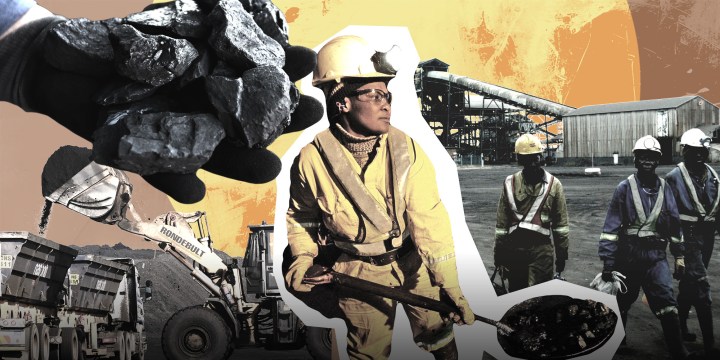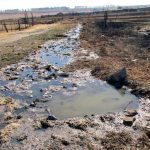ENERGY TRANSITION
How to build a ‘positive bond’ between coal and renewables, according to experts

The transition from a high-carbon energy system to a low-carbon one needn’t be a jobs bloodbath or marked by messy political battles.
Despite statements to the contrary from Minister of Mineral Resources and Energy Gwede Mantashe, there are ways to accelerate the transition from a heavily coal-dependent energy system to one based on low-emission alternatives in a way that doesn’t threaten employment or engender messy political battles.
That’s according to experts who spoke to Daily Maverick as well as a recent report by the International Energy Agency (IEA).
Jan Hinrich Glahr, the vice-president of Germany’s Renewable Energy Federation, had a message for workers concerned about job losses as the world transitions from a fossil fuel-dominated energy system to a low-carbon energy system in line with climate imperatives:
“You are a labour force. Your skills are very, very necessary, and they can also be adapted to renewable energy. It’s not only that you are stuck in the lignite coal [industry]. You are competent, you are useful whatever you can do; if you are an electrician, if you are a mechanic, if you are working wherever, we need you in the renewable energy sector.”
He was speaking to Daily Maverick on the sidelines of the 10th annual Berlin Energy Transition Dialogue held in March.
Glahr leads a projects team which is trying to “challenge the lack of training in the area of lignite coal” in Germany.
The International Energy Agency (IEA) in its recent Accelerating Coal Transitions report explains that “achieving the goal adopted at COP28 of net zero emissions of greenhouse gases from the energy sector by 2050 hinges critically on the rapid transition away from the unabated use of coal for generating electricity.
“The scale of the task cannot be overstated: coal accounts for over one-third of global power supply, in many cases from recently built plants. As the most carbon-intensive fuel, coal’s role in emissions is even bigger: globally, coal is responsible for over 40% of all energy sector CO2 emissions. If existing coal power plants and industries were to continue to operate as they do today, they would ‘lock in’ emissions pushing the world well beyond the 1.5 °C limit.”
Read more in Daily Maverick: Winds of change — the writing’s on the wall for coal
The 1.5°C target is a global threshold set by the Paris Agreement to limit the average temperature increase to no more than 1.5°C above pre-industrial levels.
This target is crucial because surpassing it could significantly amplify the risks of extreme weather, sea-level rise and loss of biodiversity, potentially leading to severe ecological and socioeconomic impacts worldwide. Staying within this limit is considered essential for the survival of many ecosystems and the protection of vulnerable communities from climate-related threats.
The IEA in its report explains that transitioning from coal is essential to keep the global average temperature increase below this target, but it’s no simple matter.
“Accelerating coal transitions will impact workers and communities that depend on coal. For that reason, comprehensive stakeholder engagement and a set of policies to manage negative impacts, including on energy affordability, energy access and socioeconomic development, are essential. These need to cover the creation of decent work opportunities, support for workers affected by energy transitions and respect for fundamental labour principles and rights,” it explains.
Read more in Daily Maverick: Crooked coal, corruption and politics — experts flag the barriers to SA’s energy transition
The report continues: “The social and economic impacts of transitioning away from the use of coal for power generation vary widely across and within countries, according to resource endowments, the structure of the economy, level of economic development, and the importance of the coal industry to local labour markets.
“National exposure to coal, as measured by our Coal Transition Exposure Index (CTEI), is highest in Indonesia, followed by Mongolia, China, Vietnam, India and South Africa. Many coal regions in those and other emerging economies are characterised by low levels of economic diversification, limiting opportunities for alternative activities and jobs.”
Yet despite these challenges, solutions exist.
Lessons for SA
Asked what lessons South Africa could draw from the German experience, Glahr said, “The most important point is it takes time, time that we do not have. If we start too late, we are running into big trouble. If you are starting too late to talk about the ways out of the coal in terms of the education, in terms of the workers, if you start that too late … the people get unemployed, and you don’t have a solution for them.
“So it needs to be a kind of a parallel process, which is not easy for the system and for a company. So what we did in Germany, we talked with business, we talked for a year to the people, to the labour people, everybody who was involved, we tried to build a positive bond between the new energy and the old energy … it is not against you, it is worldwide and it is a transition process that we can only build together … this is not a sprint, it is a marathon, it is a long way to have to go.
“Start as early as you can, try to get funding from the government, not only for technology and investment, but also conditions and the training of the people. Open them a new area where they can live, where they can earn money and have a positive perspective for their future and for their family. Because otherwise, it’s a big disappointment for the people, they are losing their jobs.”
Dr Julia Skorupska, the head of the Powering Past Coal Alliance secretariat, also spoke to Daily Maverick on the sidelines of the Berlin Energy Transition Dialogue.
“The transition in Europe is well under way,” she said. “Europe was very coal-dependent and so I think there’s a lot of really useful expertise there which is being developed on how we deliver a just transition. And so we have a lot of European members who have spent a lot of time involving communities, thinking about what the community’s aspirations are and then planning for a transition.”
Asked what the main message for South Africa was, she said, “This is a transition that is beneficial for everyone. The transition away from coal will lead to cheaper energy, greater access to energy, and ultimately to a more competitive economy, as well as reducing the health costs and the economic costs of climate change.” DM



















 Become an Insider
Become an Insider
Germany is not exactly a good example of a successful transition from fossil fuels – since their Russian connection was cut, they’ve been stuffed. Yesterday’s Financial Times headline:-
“German industry unlikely to fully recover from energy crisis, warns RWE boss ”
Meanwhile, China, which is by far the biggest and fastest adopter of renewables in the world is still finishing construction of its last few coal fired power stations. Ten years ago, they explained that the process of building and integrating renewables was not going to be quick and easy and that they would only reach peak coal by 2030 at the earliest. But, like SA, those last few big coal fired power stations are much more efficient (and less polluting) than the old ones, which is why they are part of emissions REDUCTION plans ….